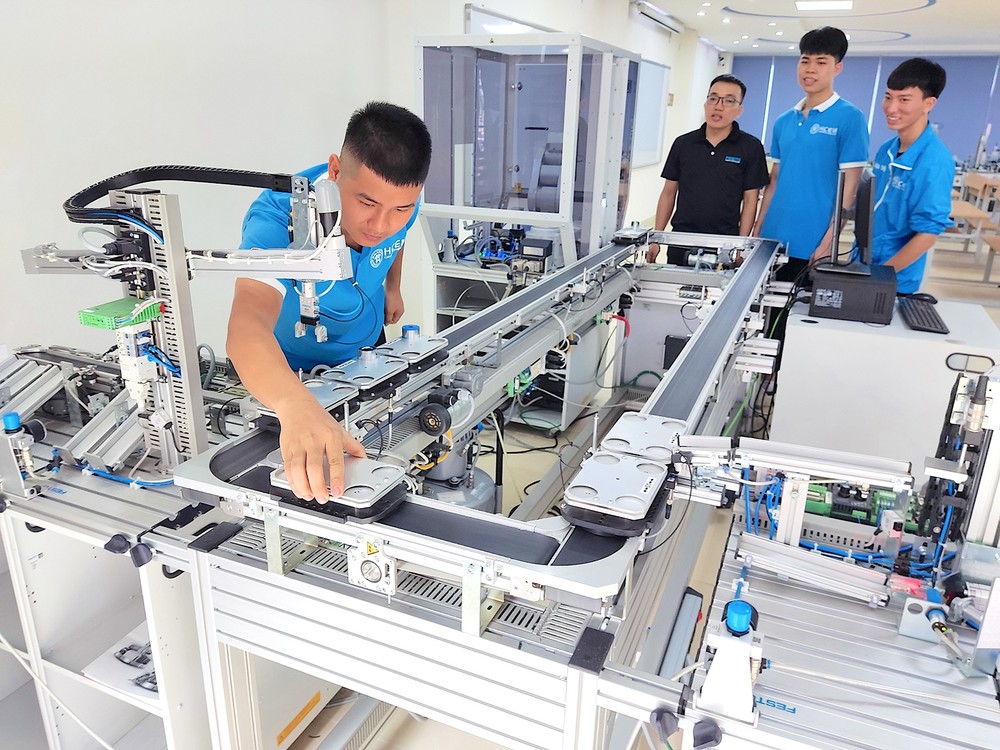
Minister of Labor, Invalids and Social Affairs Dao Ngoc Dung frankly pointed out the problem in the vocational education sector at the recent National Assembly session and affirmed that he will drastically restructure the system to promote efficiency.
About 400 vocational education establishments are located in the Southeast region with an average annual vocational training scale of over 250,000 people.
Currently, 376 vocational education establishments are set up in Ho Chi Minh City accounting for 12.51 percent of the country's vocational education establishments. Annually, more than 195,000 students graduate from vocational education facilities averagely and participate in the labor force.
However, vocational training schools are facing the work of land allocation and land lease for vocational education establishments which has not been implemented effectively, some facilities are degraded.
After nearly 35 years of formation and development, Hung Vuong Technical and Technology College is currently one of the top vocational training units in Ho Chi Minh City and the Southern region. Nearly 1,000 students graduate from the school every year and dozens of the school students won high prizes in vocational skills competitions at city, national and international levels.
However, Vice Principal Nguyen Ngoc Hanh moaned due to degraded facilities and lack of adequate investment, and students' learning conditions are not as good as expected. According to him, in 2016, the school's B-C-D area renovation and new construction project was approved by the Ho Chi Minh City People's Council with a total investment of over VND100 billion ( over US$4 million), but due to bottlenecks, the construction project was delayed.
In the North, especially in Hanoi, there are also dozens of vocational education establishments with facilities that were built 30-50 years ago; thus, they are old and in poor repair. However, they have not been granted a license for construction.
Typically, the Hanoi People's Committee approved the construction project for Hanoi Industrial Vocational College on an area of 9 hectares, with a cost of about VND894 billion since 2018, but until now the project is still on paper.
In the Central region, in the past 5 years, many colleges and intermediate schools in Da Nang City, Quang Nam province are increasingly facing the risk of closing because no students enroll in schools and teachers are highly likely to face possible unemployment.
Deputy Head of the National Assembly's Committee on Culture and Education Ta Van Ha said that in addition to the need to speed up the arrangement and re-planning of the vocational education network, inadequacies in the social contribution in this field are emerging. Many provinces and cities have not yet developed planning and plans for the network of vocational education institutions for the period after 2020; Planning and land use plans have not yet been developed for investment in construction and development of facilities built on financial social mobilization.
On the other hand, some localities are negligent in management in leasing land for investment projects without completing site clearance or allocating and leasing land to vocational training establishments without planning the land fund for social contribution-based activities, not in accordance with the planning of the local vocational training establishment network.
Accordingly, Mr. Ta Van Ha proposed that the Ministry of Labor, Invalids and Social Affairs needs to continue to focus on improving contents such as improving capacity and effective quality of state management of vocational education; promote the implementation of proposed programs, projects and plans; and arrange the network openly and flexibly.
At the same time, relevant agencies should build and improve mechanisms to encourage organizations and individuals to actively participate in vocational education as well as strengthen international cooperation for forecasting and shifting the labor structure and training structure of vocational education.
Vice Chairman of Ho Chi Minh City People's Committee Duong Anh Duc said that Ho Chi Minh City promotes the training of highly qualified human resources.
By 2025, Ho Chi Minh City will merge at least 50 percent of intermediate schools into colleges, merging ineffective colleges into effective schools. By 2030, at least 80 percent of intermediate schools will be merged into colleges. Furthermore, the city will encourage and give incentives in social contribution of implementing vocational education policies with the aim to increase the rate of trained workers by the end of 2025 to 87 percent of the total number of working workers and by 2030 to 89 percent.
























